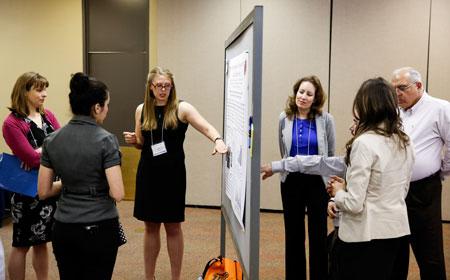Originally published April 19, 2016
By Lisa Y. Garibay
UTEP Communications
Working across the boundaries of a variety of expert arenas is no small feat. Creating the space, culture and anchors for interdisciplinary research and education is precisely what an upcoming event at UTEP aims to do.
The 4th Annual UTEP Interdisciplinary Research and Education (IDRE) Symposium takes place from 10 a.m. to 4 p.m. Monday, April 25 in the University Library’s Blumberg Auditorium. The event is free and open to UTEP faculty, staff and graduate students currently engaged in IDRE or interested in becoming involved with it. Find the registration form, agenda and more information here.

“The IDR Symposium has matured over the years to become an exemplary venue for promoting researchers’ efforts in interdisciplinary research and sharing effective practices,” Ann Quiroz Gates, Ph.D., chair of the Department of Computer Science and director of UTEP’s Cyber-ShARE Center of Excellence, said. “Bringing researchers from across campus together around provocative topics is critical for innovation and change.”
Karen Stephenson, Ph.D., who has built a brand for herself as “The Organization Woman,” will deliver the symposium’s keynote address to spark new ways to approach this type of collaboration, and guide student and faculty researchers to appreciate the value of it.
While she began as a quantum chemist and ended as a classically trained Harvard anthropologist, Stephenson sees a through line spanning the seemingly disconnected arenas.
“The combinatorial properties of large hydrocarbon chains are not all that different from humans culturally connecting,” Stephenson said. “The pursuit of the supporting data and theory to prove this took me on a journey through the sciences, mathematics, anthropology, sociology, systems theory and business. At a university, working with multiple purposes should never be misconstrued as working at cross purposes.”
Accolades Stephenson has received for her approach include being named the first Katherine Houghton Hepburn Fellow, an honor bestowed by Bryn Mawr College for her groundbreaking work in the social sciences. She also has been distinguished as only one of four women in Random House’s “Guide to Management Gurus.” Malcolm Gladwell wrote about her in The New Yorker for her innovative research on the workplace and corporate office.
With more than two decades of teaching at the University of California, Los Angeles and Harvard University, she now lectures at Yale University and Erasmus University in the Netherlands.
One convert after attending the IDRE Symposium for the first time in 2015 is Guillermina Solis, Ph.D., assistant professor in the UTEP School of Nursing. She was thrilled by the opportunity to explore ways to expand connections with other faculty and researchers who had similar interests but whom she may not have discovered otherwise.
“IDR has allowed me to expand beyond nursing and share my enthusiasm and scholarly activities with faculty and students throughout campus,” Solis said. “As a nursing faculty, I fit in many areas and I feel privileged to collaborate with other researchers and community advocates to improve the health and services of the residents in our border region. I look forward to this year’s conference to connect with others and renew collaborations.”
Solis became so invested that she joined UTEP’s Center for Civic Engagement and recently completed its first interdisciplinary community service project in collaboration with several UTEP departments and local community health partners. She also grabbed the opportunity to apply for funding for a geriatric research projects in collaboration with Guillermina Nunez-Mchiri, Ph.D., associate professor of anthropology.
Office of Research and Sponsored Projects (ORSP) Manager Andrea Tirres, who has overseen the symposium’s organization and evolution, pointed out that registration demographics thus far reflect the richness of this kind of collaboration.
“When we look at who has registered for the symposium this year, we see a diverse group of people, from graduate students to professors to program managers, which is indicative of the breadth of experiences and skill sets that propel interdisciplinary teams forward,” she said. “In addition, almost 40 percent of the registrants thus far are first-time symposium registrants. This is positive for us as we strive to be inclusive and supportive of individuals who are interested in forming new connections and cultivating existing professional relationships in responding to society’s big challenges.”
Craig Tweedie, Ph.D., associate professor of biological sciences who holds an interdisciplinary appointment, pointed out that many of the world’s most urgent problems are being solved by crossing disciplinary boundaries with individual expertise contributing to a sum with exponentially greater impact. One example is the current Zika virus outbreak, which is not just for biomedical researchers to battle. A successful defeat of this disease will come from economists, environmental scientists and sociologists working together with those biomedical experts to address where the disease comes from and how it is spread, along with what human behavior needs to change.
Tweedie is excited by how the culture at UTEP has shifted over the last decade, with many thanks to the efforts of the ORSP, which organizes the IDRE Symposium and provides student connectivity, faculty support and seed funding for projects.
“When you put some incentives out, people will think of ways to be creative,” Tweedie said. “If you put walls up, they think within those walls. They’re still creative within a discipline, but they’re not going across disciplines. What ORSP has done is say, ‘Let’s not make walls.’”
With the forthcoming Interdisciplinary Research Building and even greater resources coming to the fore, Tweedie believes the University is at the cusp of a turning point.